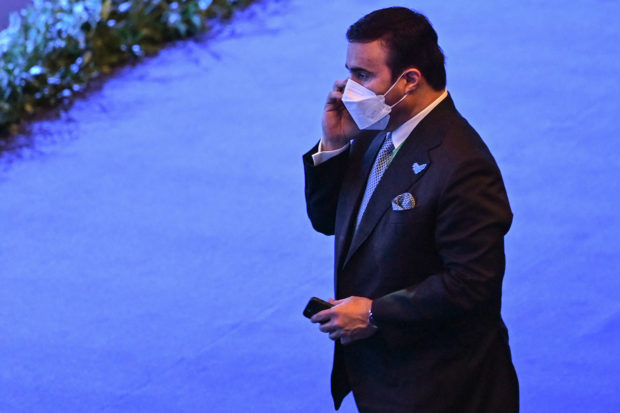Emirati general accused of torture up for Interpol top role

Major General Ahmed Nasser al-Raisi, inspector general at the UAE interior ministry and candidate for the 2021 Interpol election speaks on the phone on the first day of the 89th Interpol General Assembly in Istanbul on November 23, 2021. AFP
‘Torture and barbarism’
In October 2020, 19 NGOs, including Human Rights Watch, expressed concern about the possible choice of Raisi, who they described as “part of a security apparatus that continues to systematically target peaceful critics”. Complaints of “torture” were filed against the general in recent months in France and Turkey, which is hosting the general assembly in Istanbul this week. One of the complainants, British national Matthew Hedges, said he was detained and tortured between May and November 2018 in the United Arab Emirates, after he was arrested on false charges of espionage during a study trip. In another complaint, lawyers for the Gulf Centre for Human Rights accuse the Emirati general of “acts of torture and barbarism” committed against government critic Ahmed Mansoor. Mansoor has been detained since 2017 in a four-square-metre (43-square-foot) cell “without a mattress or protection against the cold” and “without access to a doctor, hygiene, water and sanitary facilities”, the lawyers said. These complaints have not resulted in any formal proceedings against Raisi. Interpol Secretary General Jurgen Stock, who handles day-to-day management of the organisation, told journalists he was “aware of these accusations, which are currently an issue between the parties involved”. “It will be on Thursday the role of the member countries of Interpol to decide” on whether Raisi should get the role, said Stock, who was given a second five-year term in 2019. South Korean Kim Jong-yang has been president of the organisation since the 2018 arrest of his predecessor Meng Hongwei in China, where he had served as a vice minister of public security. “The questionable reputation of Raisi… whether deserved or not, is an important factor for the organisation,” said Mathieu Deflem, sociology professor at the University of South Carolina and author of books on Interpol. A report by a former British director of public prosecutions, Sir David Calvert-Smith, that was published in March concluded that the UAE hijacked the system of red notices — international wanted notices — to put pressure on opponents.‘Stymie reform’
If he is elected on Thursday, Raisi would “likely work with like-minded governments to stymie reform efforts pushing for greater transparency in Interpol”, Texas A&M’s Lemon said. Lemon said the UAE donated $54 million (48 million euros) to Interpol in 2017 — an amount almost equivalent to the required contributions of all the organisation’s 195 member countries. This amounted to $68 million (60 million euros) in 2020. The UAE gave or had pledged to Interpol around 10 million euros in 2019, approximately seven percent of its total annual budget. “Such funding reduces other members’ ability to influence the organisation,” Lemon said. The Emirates hosted the general assembly in 2018 and wanted to host it again in 2020, he said. That meeting was postponed due to Covid, and went to Turkey instead — though the government of Recep Tayyip Erdogan also faces accusations of mass detentions, abuse of trial process and repression. Czech candidate Havrankova also believes these “very serious allegations” might prevent her rival’s election. “I’m just trying to bring the alternative,” she said. “It’s for the delegations to decide how they want their organisation to be led.”
READ NEXT
EDITORS' PICK